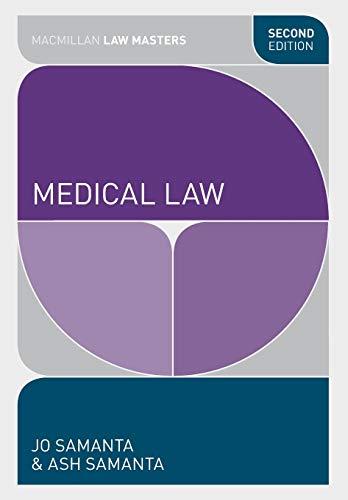Question
Answer the questions below. A mere yes or no will not merit any points. Cite the applicable provision in your explanation. (Section 73-74 of the
Answer the questions below. A mere yes or no will not merit any points. Cite the applicable provision in your explanation. (Section 73-74 of the Corporation Code of the Philippines)
1.Why can a stockholder have the right to inspect corporate books and records? Is this right absolute or allows for exception? Explain.
2.X, a stockholder, requests that he be allowed to inspect certain corporate records giving a proper purpose for the exercise of the right. Can the corporation refuse on the allegation that it suspects that X has interior or improper intentions?
3.In number (2) above, the inspection shall be conducted by L, a lawyer, who is not a stockholder of the corporation, without the presence of X. Is this allowed?
Answer the questions below. A mere yes or no will not merit any points. Cite the applicable provision in your explanation. (Section 75-79) (Section 80-85 of the Corporation Code of the Philippines)
1.What is the effect of a merger of two corporations (A, Inc. and B, Inc.) where the articles of merger were not registered with the SEC due to incomplete documentation?
a.For purposes of imputing liability, how should a third party (C) treat the corporation? Why?
b.Who can C sue for corporate liability? Why?
2.Where one corporation sells or otherwise transfers all of its assets to another corporation, is the latter liable for the debts and liabilities of the transferor?
3.Assuming a stockholder disagrees with the issuance of new shares and the pricing for the shares; may the stockholder invoke his appraisal rights and demand payment for his shareholdings?
Answer the questions below. A mere yes or no will not merit any points. Cite the applicable provision in your explanation. (Section 86-94 of the Corporation Code of the Philippines)
1.Adventist University of the Philippines (AUP) is a non-stock, non-profit educational institution. Petonillo Barayuga was appointed by the AUP's Board of Trustees as its President in 2001. AUP subsequently amended its By-Laws to state that members of the Board of Trustees were to serve a term of office of only two years; and the officers, who included the President, were to be elected from among the members of the Board of Trustees during their organizational meeting, which was held during the election of the Board of Trustees every two years.In 2003, the Board voted to remove Barayuga as president. This prompted Barayuga to file a petition for injunction with damages against AUP, contending among others, that the Board relieved him of the presidency without valid grounds despite his five-year term. The RTC ruled in favor of Barayuga. The CA, on the other hand, ruled in favor of AUP. Can an officer-elect of a non-stock educational corporation occupying a hold-over capacity be removed without cause upon the appointment of his or her successor?
2.If a non-stock corporation earns profit, can it be considered as a profit-making corporation?
Answer the questions below. A mere yes or no will not merit any points. Cite the applicable provision in your explanation. (Section 95-104 of the Corporation Code of the Philippines)
1.What conditions are prescribed by law for the validity of restrictions on the right to transfer shares in a close corporation?
2.Why is there a need for restrictions on stock transfer in close corporations?
Step by Step Solution
There are 3 Steps involved in it
Step: 1

Get Instant Access to Expert-Tailored Solutions
See step-by-step solutions with expert insights and AI powered tools for academic success
Step: 2

Step: 3

Ace Your Homework with AI
Get the answers you need in no time with our AI-driven, step-by-step assistance
Get Started


